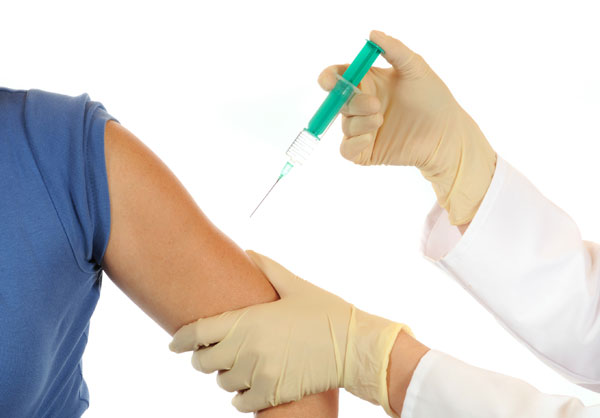Steroid Injection May Prevent PTSD

Get the world’s most fascinating discoveries delivered straight to your inbox.
You are now subscribed
Your newsletter sign-up was successful
Want to add more newsletters?

Delivered Daily
Daily Newsletter
Sign up for the latest discoveries, groundbreaking research and fascinating breakthroughs that impact you and the wider world direct to your inbox.

Once a week
Life's Little Mysteries
Feed your curiosity with an exclusive mystery every week, solved with science and delivered direct to your inbox before it's seen anywhere else.

Once a week
How It Works
Sign up to our free science & technology newsletter for your weekly fix of fascinating articles, quick quizzes, amazing images, and more

Delivered daily
Space.com Newsletter
Breaking space news, the latest updates on rocket launches, skywatching events and more!

Once a month
Watch This Space
Sign up to our monthly entertainment newsletter to keep up with all our coverage of the latest sci-fi and space movies, tv shows, games and books.

Once a week
Night Sky This Week
Discover this week's must-see night sky events, moon phases, and stunning astrophotos. Sign up for our skywatching newsletter and explore the universe with us!
Join the club
Get full access to premium articles, exclusive features and a growing list of member rewards.
A steroid injection given shortly after a traumatic event could reduce the risk that the victim will later develop post-traumatic stress disorder, a new study suggests.
In the study, which involved 17 trauma patients, those who received injections of the steroid hormone cortisol within six hours of their injury were significantly less likely than those not given injections to develop PTSD several months later, the researchers said.
The findings suggest there may be a "window of opportunity" immediately following a trauma during which action can be taken to prevent PTSD, said the researchers, who are now conducting a wider study.
"One can think about it as the morning-after pill for PTSD," said study researcher Joseph Zohar of Tel Aviv University in Israel. Doctors call such precautions that are taken after the fact, such as the contraceptive pill ingested after sex, "secondary prevention."
If the findings are confirmed, "this will be the first time that there is secondary prevention in psychiatry," Zohar said.
The study will be published in the October issue of the journal European Neuropsychopharmacology.
PTSD and cortisol
Get the world’s most fascinating discoveries delivered straight to your inbox.
When people experience stress or anxiety, the body responds by releasing stress hormones, including cortisol. In the new study, Zohar and colleagues tried to mimic the natural response of the body by administering hydrocortisone, the pharmaceutical form of cortisol.
The study involved patients who visited an emergency department after traumatic events, including car crashes and work-related accidents. Participants were randomly assigned to receive a single shot of hydrocortisone or a placebo.
After three months, three of the eight patients in the placebo group were diagnosed with PTSD. After one month, one person who received hydrocortisone showed signs PTSD, and after three months, no one in the hydrocortisone group did.
If larger studies confirm the injections effectiveness, "you could theoretically have a treatment that would markedly help reduce the emergence of post traumatic stress disorder in trauma victims," said Dr. Charles Nemeroff, professor and chairman of psychiatry at the University of Miami Miller School of Medicine, who was not involved in the study.
Quite a few patients treated with hydrocortisone dropped out of the study before the one month and three month mark, and it would be important to know whether leaving had anything to do with the treatment or their current mental states, Nemeroff said.
Preventing bad memories
Because the participants in the study had been in accidents of everyday life, it's unclear whether a shot of hydrocortisone would have the same effect on someone who experienced a different type of trauma, such as one related to combat, Zohar said.
It's possible people who are predisposed to PTSD have abnormalities in the way their brains release cortisol, Zohar said. By injecting hydrocortisone, the researches may be augmenting the stress response and thus helping to prevent PTSD.
Cortisol also may act to prevent the formation of memories, Zohar said.
For people with PTSD, "the past is always present," Zohar said. "The individuals are haunted by their traumatic experience." Administering cortisol might prevent PTSD by not allowing the complete formation of memories of a traumatic event.
Zohar said he and his colleagues are now carrying out a larger trial using hydrocortisone on trauma victims.
Pass it on: A single shot of hydrocortisone may prevent the development of PTSD in trauma victims.
This story was provided by MyHealthNewsDaily, a sister site to LiveScience. Follow MyHealthNewsDaily staff writer Rachael Rettner on Twitter @RachaelRettner. Find us on Facebook.

Rachael is a Live Science contributor, and was a former channel editor and senior writer for Live Science between 2010 and 2022. She has a master's degree in journalism from New York University's Science, Health and Environmental Reporting Program. She also holds a B.S. in molecular biology and an M.S. in biology from the University of California, San Diego. Her work has appeared in Scienceline, The Washington Post and Scientific American.
 Live Science Plus
Live Science Plus










